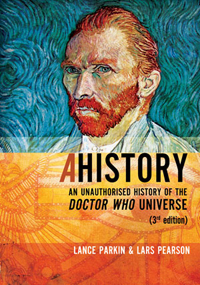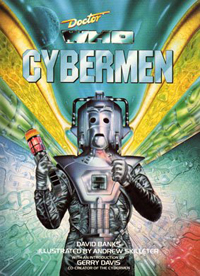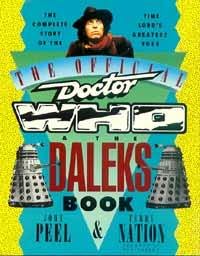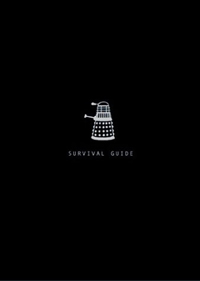of the Daleks
of the Daleks
of the Daleks
of the Daleks
of the Daleks
of the Daleks
The following conventions and over-arching conjectures govern the history of the Dalek race as presented within this section of the site.
When determining dates for events, an attempt has been made to maintain consistency within the greater Doctor Who universe. In order to achieve this goal without having to assign dates or time periods to each and every Doctor Who story, two invaluable publications influenced the development of this guide.
The first of these is Lance Parkin's A History. This book offers a complete accounting of the televised Doctor Who stories up until the book's publication. The book also incorporates the novels published during the 1990s and 2000s by Virgin Books and BBC Publishing and the audio adventures produced by Big Finish Productions. Many comic strips are also covered, including the TV21 Dalek strip. The timeline described in that book is, in the opinion of this author, the most thorough accounting of events within this fictional universe. Each dating is discussed with reference to other Doctor Who time lines. The book includes interesting asides about topics such as the Time War.
The second reference work is David Banks' Cybermen book. The theories presented in that text make a great deal of sense when considering the variations to the Cybermen's design within the televised series up until (not including) 1988's Silver Nemesis. In this Dalek guide, the author attempts to do the same with the development of the Dalek race and the concept of "Generations" of Daleks was influenced by Banks' grouping of various Cyber stories into distinct factions of Cybermen through their evolution.
It would be remiss to discuss Doctor Who reference works without mentioning the published works that deal solely with the Daleks themselves. Of these, John Peel's "Terry Nation's Dalek Book" provides an excellent insight into the production of the Doctor Who Dalek stories and includes the original outline to the first tale from 1963 together with that for Nation's proposed Dalek spinoff series. The book also presents an interesting history of the Dalek race that referenced all stories up to and including Revelation of the Daleks. While that history varies quite drastically from the one presented here, it is well worth getting hold of a copy as it was the first real attempt at producing such a history and some of the ideas generated in that work carry through to this guide.
The Dalek Survival Guide is a fun book that has an overview of the different kinds of Dalek (including three Emperors and various Dalek Supremes) and offers a quick discussion of three conflicting versions of the Dalek origin story. As with A History and Cybermen, the author provides a number of notes after each section of the history's breakdown. These notes serve as an insight into the thought processes that led to the development of the history and in places will also present the time-placements suggested by other time lines, both formally published and those available from the World Wide Web.
While this site's goal is to create a coherent history of the Dalek race, its views are by no means definitive or official and there is no intention to undermine the opinions and views of other researchers. Indeed, the purpose of presenting as complete a source list and web links as possible is to encourage readers to seek out differing views and opinions in order to create discussion and possibly influence the creation of future time lines.
This site examines at the history of the Daleks from their own perspective rather than from Earth's or that of a certain Time Lord. In this way, a clear Dalek-centric sequence of events can be observed. Where possible, Earth dates are applied to the events within this history. Many are approximated or guessed and these approximations are clearly indicated within the text. Since the time-line is from the Daleks' own view point, stories that feature Time Travel have their main entry at their point of origin, rather than the time period that is being visited, influenced or tampered with. Where source-dates are not evident from the stories themselves, the author has provided the thought process that has led to the ordering and placement of stories.
As several of the Dalek stories deal heavily with concepts such as temporal paradoxes and attempts to divert the course of events from the true time line, several divergent time-lines are created. These time lines are discussed within this site at the time the relevant Dalek plan was instigated and the events of divergent time lines are clearly identified as being such.
The events of the Last Great Time War which served as a back-drop to Doctor Who's relaunch in 2005, are shrouded in mystery. Events that are viewed as being instrumental in leading up to this final conflict are indicated in the text by the [TW] suffix. There is some debate as to whether the Time War between the Time Lords and the Daleks is the same one as referenced in the BBC Books range of Eighth Doctor Adventures. Russell T Davies (original producer of the new series) has stated that the events (should the novel range be considered canonical) are different wars, but some fans find it difficult to fathom the double-destruction of Gallifrey that this implies. The book A History provides a possible reconciliation of the two Wars into one event.
Since Skaro's atmosphere seems to be of similar composition to that of Earth and the gravity is equal (according to The Daleks), it is the convention of this document to extrapolate that a Skarosian year is equal to an Earth year – even if different units of time are used to divide that year into seasons, months, weeks etc. We know, for example, that the Dalek (and presumably Kaled) equivalent of a second is the Rel, which lasts for around one point three seconds in the Earth reckoning. This helps simplify the dating process and seems to have been the implication followed by episode writers for the series.



